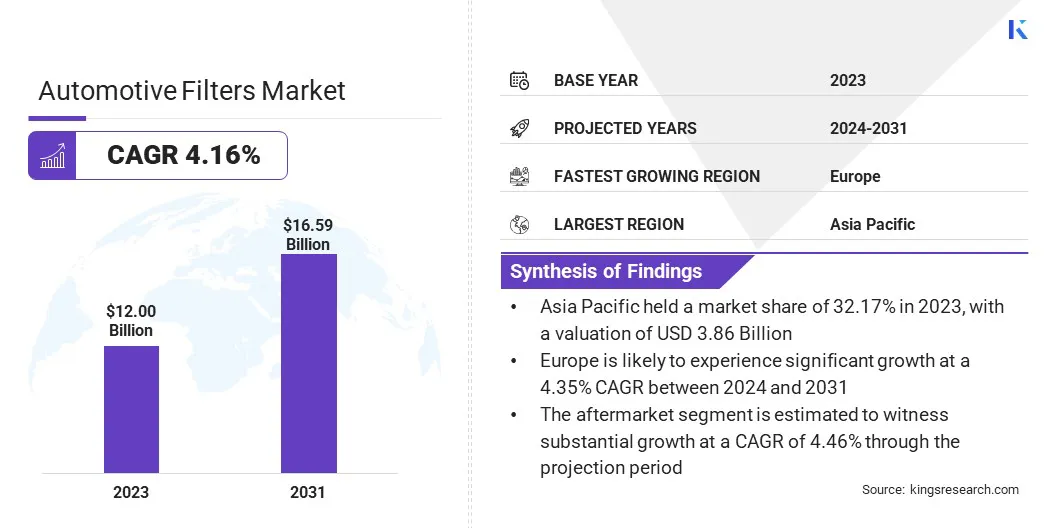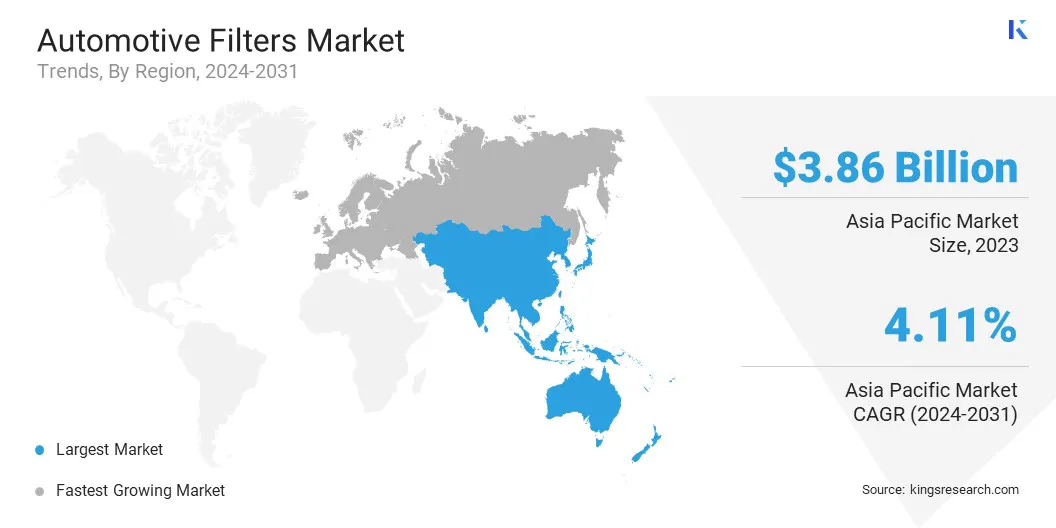Automotive Filters Market Size
The global Automotive Filters Market size was valued at USD 12 billion in 2023 and is projected to reach USD 16.59 billion by 2031, growing at a CAGR of 4.16% from 2024 to 2031. In the scope of work, the report includes products offered by companies such as MANN+HUMMEL, Donaldson Company, Inc., Robert Bosch GmbH, DENSO CORPORATION, Baltic Filter, MAHLE Aftermarket GmbH, TOYOTA BOSHOKU CORPORATION, Valeo, Hengst SE, K&N Engineering, Inc. and Others.
Stringent emission regulations imposed by governments worldwide are a significant factor fueling the growth of the automotive industry. These regulations compel manufacturers to produce vehicles with lower emissions to mitigate environmental impact. Automotive filters play a crucial role in compliance with regulations as they serve as integral components in emission control systems.
Filters such as catalytic converters and diesel particulate filters help trap harmful pollutants before they are released into the atmosphere. As emission standards become more stringent, the demand for advanced filtration technologies continues to rise. Manufacturers are compelled to innovate and develop more efficient filters to meet these regulations while maintaining optimal engine performance.
Automotive filters are essential components used to remove contaminants and impurities from various fluids and air within vehicles. They ensure the efficient operation and longevity of automotive systems by effectively preventing harmful particles from entering critical components.
- The main types of automotive filters include oil filters, air filters, fuel filters, and cabin air filters. These filters are utilized in various types of vehicles, including cars, trucks, motorcycles, and off-road vehicles. Moreover, automotive filters are supplied by both OEMs and the aftermarket.

Analyst’s Review
The market is witnessing increased demand for automotive filters due to the rising global vehicle production. Additionally, growing awareness regarding environmental pollution and the importance of vehicle maintenance among consumers is boosting market development. Technological advancements in filter materials and designs are also contributing to market growth by improving filter efficiency and durability.
Furthermore, the expanding automotive aftermarket coupled with the increasing prenetration of electric vehicles present lucrative opportunities for filter manufacturers. The market is poised to observe a significant expansion in the forthcoming years, fueled by evolving consumer preferences, regulatory requirements, and technological innovations.
Automotive Filters Market Growth Factors
The rising demand for electric vehicles is projected to foster the growth of the automotive filters market. As the global adoption of electric vehicles increases, there is a growing need for specialized filters to maintain the performance and longevity of EV components.
While EVs produce zero tailpipe emissions, they still require filtration systems to maintain cabin air quality and facilitate battery cooling. Additionally, electric drivetrains necessitate efficient filtration of cooling fluids and lubricants to ensure optimal performance. This trend is driving innovation in filter technologies tailored specifically for electric vehicles, such as advanced cabin air filters capable of removing particulate matter and odors.
Moreover, the transition to electric mobility presents potential opportunities for automotive filter manufacturers to collaborate with EV OEMs and develop custom filtration solutions. The expansion of the electric vehicle market is expected to create new avenues for growth and innovation in the automotive filters industry.
The high cost of advanced filter technologies poses a significant restraint to the development of the market. Although these technologies offer superior performance and efficiency, their production costs are often considerably higher compared to conventional filter materials. This increased cost is primarily due to the use of innovative materials and manufacturing processes required to achieve advanced filtration capabilities.
Additionally, the high initial investment required to implement advanced vehicle filtration systems may deter some manufacturers from incorporating them into their product offerings. Despite the numerous benefits offered by advanced filter technologies, their high cost remains a key barrier to widespread adoption in the automotive industry.
Automotive Filters Market Trends
The rise of lightweight materials is a significant trend reshaping the automotive filters market landscape. Manufacturers are increasingly incorporating lightweight materials such as advanced plastics, composites, and aluminum alloys into filter designs to reduce overall vehicle weight. This trend is further driven by the automotive industry's growing focus on improving fuel efficiency and reducing carbon emissions.
By using lightweight materials in filter construction, manufacturers are striving to achieve weight savings without compromising filtration performance. Additionally, lightweight filter materials contribute to overall vehicle weight reduction, leading to improved fuel economy and a lower environmental impact. Moreover, these materials offer several benefits such as corrosion resistance and durability, thereby enhancing the longevity of automotive filters.
- As automotive manufacturers continue to prioritize light weight materials, the demand for filters made from lightweight materials is expected to increase significantly, thus driving innovation and stimulating market growth.
Segmentation Analysis
The global market is segmented based on type, vehicle, distribution channel, and geography.
By Type
Based on type, the market is categorized into oil filters, fuel filters, air filters, and cabin filters. The air filter segment dominated the automotive filters market with a share of 40.83% in 2023 on account of its critical role in maintaining engine performance and longevity.
Air filters, which are essential components in vehicles, are responsible for removing contaminants and particulate matter from the incoming air stream before it enters the engine combustion chamber. A clean and efficient air filter ensures optimal airflow, preventing engine damage and maximizing fuel efficiency.
Additionally, stringent emission regulations worldwide necessitate the use of high-quality air filters to trap harmful pollutants and reduce emissions. As a result, the persistently high demand for air filters is contributing to the dominant position of the segment in the market.
By Vehicle
Based on vehicle, the market is divided into passenger cars, light commercial vehicles, and heavy commercial vehicles. The heavy commercial vehicles segment is anticipated to witness the highest automotive filters industry growth of 6.09% over the forecast period as a result of increasing global trade activities and ongoing infrastructure development projects.
Heavy commercial vehicles, including trucks, buses, and construction equipment, play a crucial role in transporting goods and materials across long distances. With the globalization of trade and the expansion of infrastructure projects, there is a growing demand for heavy commercial vehicles to support logistics and construction activities.
As a result, the use of heavy commercial vehicles is expected to rise, which is driving the need for reliable filtration systems to ensure optimal engine performance and compliance with emission standards. Additionally, technological advancements in heavy commercial vehicle engines and emission control systems are fostering the adoption of advanced filtration technologies, thereby fueling the growth of the segment.
By Distribution Channel
Based on distribution channel, the automotive filters market is bifurcated into OEM and aftermarket. The aftermarket segment is estimated to witness substantial growth at a CAGR of 4.46% through the projection period.
The increasing vehicle population has led to a growing demand for replacement automotive filters, driven by the necessity for regular maintenance of older vehicles. Moreover, the aftermarket offers a wide range of filter options from various manufacturers, providing consumers with flexibility and choice based on their preferences and budgetory considerations.
Furthermore, the aftermarket segment benefits from the expanding e-commerce platforms, which make it easier for consumers to purchase filters online and facilitate access to a broader market. Additionally, the aftermarket segment is witnessing expansion due to growing consumer awareness regarding the importance of vehicle maintenance and the role of quality filters in enhancing vehicle longevity and performance.
Automotive Filters Market Regional Analysis
Based on region, the global market is classified into North America, Europe, Asia-Pacific, MEA, and Latin America.

The Asia-Pacific Automotive Filters Market share stood around 32.17% in 2023 in the global market, with a valuation of USD 3.86 Billion, primarily fueled by the region's robust automotive industry and increasing vehicle production.
Countries such as China, Japan, India, and South Korea are among the largest automotive markets globally, exhibiting considerable demand for automotive filters due to the growing number of vehicles and stringent emission regulations. Moreover, the rapid urbanization and industrialization in the region have led to increased awareness regarding air pollution and the importance of vehicle maintenance, thereby boosting the demand for automotive filters.
- Additionally, the presence of key filter manufacturers and suppliers in countries such as China and Japan are contributing to the dominance of the Asia-Pacific region in the automotive filters market.
Europe is likely to experience significant growth at a 4.35% CAGR between 2024 and 2031. The region's stringent emission regulations, exemplified by standards such as Euro 6, are supporting the adoption of advanced filtration technologies in vehicles to reduce harmful emissions. Additionally, the increasing focus on environmental sustainability and air quality improvement initiatives by governments and regulatory bodies are propelling the demand for automotive filters in Europe.
Moreover, the region's strong automotive manufacturing base, particularly in countries such as Germany, France, and Italy, provides ample opportunities for filter manufacturers to cater to both OEM and aftermarket demands. Furthermore, technological advancements and investments in research and development are expected to drive innovation in filter materials and designs, thereby stimulating regional market growth.
Competitive Landscape
The automotive filters market report will provide valuable insight with an emphasis on the fragmented nature of the industry. Prominent players are focusing on several key business strategies such as partnerships, mergers and acquisitions, product innovations, and joint ventures to expand their product portfolio and increase their market shares across different regions.
Manufacturers are adopting a range of strategic initiatives, including investments in R&D activities, the establishment of new manufacturing facilities, and supply chain optimization, to strengthen their market standing.
List of Key Companies in Automotive Filters Market
- MANN+HUMMEL
- Donaldson Company, Inc.
- Robert Bosch GmbH
- DENSO CORPORATION
- Baltic Filter (MFilter)
- MAHLE Aftermarket GmbH
- TOYOTA BOSHOKU CORPORATION
- Valeo
- Hengst SE
- K&N Engineering, Inc.
Key Industry Development
- January 2024 (Launch): Robert Bosch introduced FILTER+pro, a new filter designed to mitigate the risk of germ transmission. Featuring multiple strategically aligned filter layers, this enhanced offering guarantees cleaner air in the vehicle cabin with significantly reduced pollutants. The ultrafine microfiber layer effectively filters over 98% of particulate matter sized 2.5 micrometers or larger.
The Global Automotive Filters Market is segmented as:
By Type
- Oil Filters
- Fuel Filters
- Air Filters
- Cabin Filters
By Vehicle
- Passenger Cars
- Light Commercial Vehicles
- Heavy Commercial Vehicles
By Distribution Channel
By Region
- North America
- Europe
- France
- U.K.
- Spain
- Germany
- Italy
- Russia
- Rest of Europe
- Asia-Pacific
- China
- Japan
- India
- South Korea
- Rest of Asia-Pacific
- Middle East & Africa
- GCC
- North Africa
- South Africa
- Rest of Middle East & Africa
- Latin America
- Brazil
- Argentina
- Rest of Latin America


